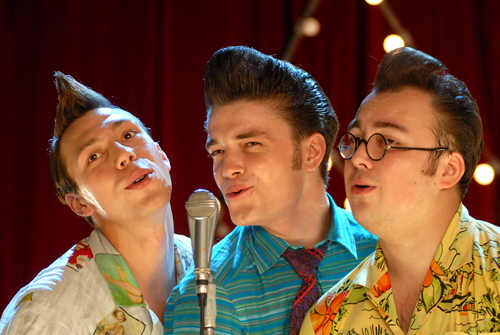The hipster is seen by many as a mainstay of pop culture here in Portland, but Valeriy Todorovskiy’s 2008 musical Hipsters offers a starkly different depiction. Filmed from a Russian perspective during the Stalinist regime of the 1950s, this drama tells the story of youths using jazz and fashion to rebel against social conformity.
Hipsters take Moscow

The hipster is seen by many as a mainstay of pop culture here in Portland, but Valeriy Todorovskiy’s 2008 musical Hipsters offers a starkly different depiction. Filmed from a Russian perspective during the Stalinist regime of the 1950s, this drama tells the story of youths using jazz and fashion to rebel against social conformity.
Hipsters will show at the Northwest Film Center this weekend in a series of evening screenings from Friday, July 20, through Sunday, July 22.
Set in 1955 Moscow, the film follows the evolution of Mels (Anton Shagin), a budding young member of the Communist Youth League. Mels’ world is turned upside down when he and his friends raid a party thrown by the hipsters, a non-conformist crowd of peers who dress in vibrant American fashions and swing to American jazz.
The Communist Youths forcibly cut apart the hipsters’ clothing and pompadours as Mels chases a fleeing girl into the wilderness. There he meets—and lets escape—Polly (Oksana Akinshina), the girl of his dreams.
Mels’ infatuation with Polly draws him slowly to the heart of the hipster scene, where young Soviets dare to dress in the face of Communist authority. Mels treks through dark alleys to purchase colorful suits, ties and even a saxophone. The hipsters, initially skeptical of his intent, nonetheless take in the Communist Youth after the gang’s alpha, Fred (Maksim Matveyev), accepts him as a friend.
During his pursuit of Polly, Mels comes to embrace hipster counterculture, despite the friction it creates with the rest of his world.
People on the streets heckle him and assault his brother, and the Communist Youth League begins to shun him as a traitor. The Communist Youth leader, Katya (Evgeniya Khirivskaya), makes an attempt to woo him back into conformity and vows revenge when he turns her down.
Throughout his time among the hipsters, Mels masters jazz and falls in love, and even becomes a sort of gang alpha of his own after Fred leaves for America. His hard-fought romance with Polly is a path of adversity as he learns more about the mysterious girl holding his heart. But he remains true, struggling to protect her and his friends from the wrath of the Communist Youths even as they stage another raid against the hipsters, targeting their wayward comrade.
Hipsters offers a story both fun and dramatic, told in Russian, with subtitles, in a musical format. The actors are sharp and witty, delivering memorable performances and compelling characters. The step-by-step evolution of Mels throughout the film offers an engaging look at the evolution of Western cultural elements in Soviet Russia, and his romance with Polly reaches notes both epic and quaint.
The film also manages a tone of contrasts, both visually and thematically. Most of Hipsters is shot in dreary back alleys and run-down social halls, where the imposing gloom of the current regime lends the film a sort of gray backsplash.
The background characters dress in drab tones and mill about listlessly or march imperiously. This underlying tone is completely offset by the bright colors and larger-than-life personalities of the hipsters. Every scene is a dynamic visual conflict between color and conformity.
The contrasts run through the soundtrack as well, which features stage-musical-style Russian ballads and unapologetic American jazz. The film is light and lively with saxophone solos and swing dancing, even as the Communist Youths march to anthems in an effort to retain order. The pacing of song and dialogue is brilliantly executed, with neither overwhelming the viewing experience through overuse.
The plot arc is also well-timed, with a fluid progression of character relationships and conflicts. Most of the film’s focus falls on Mels and his evolving relationships with Polly and the hipsters, with the Communist Youths taking a secondary role in the story.
The last half hour offers several fascinating revelations and, though there are a few moments that seem a little rushed toward the conclusion, the ending ties everything together into a spirited statement about the film’s core themes.
Altogether, Hipsters offers an intriguing look at an aspect of Soviet Russia little known to the West with whimsy and pride. Great music and a lively tale about the vibrancy of youth and non-conformity make this the perfect cap for a summer evening.
Hipsters (2008)
Whitsell Auditorium
1219 SE Park Ave.
July 20–22, 7 p.m.
$9 general, $8 students and PAM members






